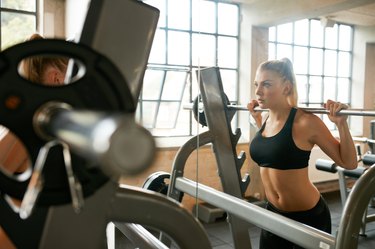
The squat is an intense exercise that requires exact technique to get the full benefit and avoid injury. Squats engage the quadriceps, gluteals, hips, hamstrings and calf muscles. The core muscles of the lower back and abdominals also are engaged to stabilize the torso. Keeping your back straight during performance is paramount.
Barbell Squats
Video of the Day
Step 1
Position yourself beneath the bar on a power rack or squat rack. The bar should be set slightly below shoulder-height. Stand with your feet shoulder-width apart and toes pointing ahead. Rest the bar on top of your trapezius muscles, not on the back of your neck. Take a wide overhand grip on the bar for stability.
Video of the Day
Step 2
Keep your back straight, straighten your knees and lift the bar from the rack. Keep your head up and look straight ahead as you step back from the rack with the bar resting on top of your shoulders. Pull your shoulders back. If you round your shoulders or look down, the bar might roll onto the back of your neck and cause you to round your back. Bend your knees and lower your body into a squat in a controlled fashion. Push your butt and hips back in a "sitting down" motion and push your chest out to ensure your back remains straight.
Step 3
Tighten your abdominal and erector spinae or back muscles to stabilize your trunk. This helps keep your back straight as you drop into a squat. Inhale as you do so. Stop when your thighs are parallel to the floor.
Step 4
Push straight up from your heels and return to a standing position once your thighs are parallel to the floor. Exhale as you push up. Keep your core muscles taut, your shoulders back and head up to help maintain a straight back.
Body-Weight Squats
Step 1
Assume a comfortable stance with your feet slightly more than hip-width apart and toes slightly turned out. Hold both arms in front of you at shoulder-level with your elbows slightly bent. Keep both arms parallel to the floor. Keep your back straight, your head up and fix your gaze ahead.
Step 2
Inhale and tighten the core muscles of your abdominals and lower back. Bend your knees and slowly drop into a squat. Push your butt and hips back to help keep your back straight. Do not let your knees fold inward. Keep them positioned over your feet. Keep your head up, arms parallel to the floor and your shoulders pulled back.
Step 3
Go as low as you can without lifting your heels, but stop once your thighs are parallel to the floor. Do not pause. Exhale, tighten your core muscles to maintain the integrity of your posture, and push up from your heels to return to a standing position.
Tip
Move only your hip, knee and ankle joints when doing squats.
Start with a light weight until you are comfortable with the movement.
Increase your weight gradually and only use heavy weights once you have perfected your technique.
Wear a lifting belt to support your lower back and help keep your back straight.
Free squats without weights may not place as much pressure on your skeletal system, but it is essential to keep correct posture and a straight back during performance. Do not round your shoulders as you drop into a squat and do not "bounce" up from the squat position.
Warning
Maintain total focus while doing squats. Any break in your concentration may cause you to relax your core muscles and round your back.
Do not lean forward excessively as you drop into a squat.